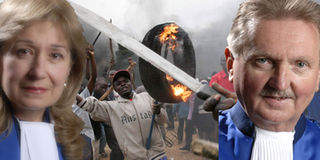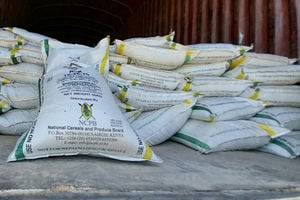Suspects’ lawyers poke holes into Ocampo evidence

Photos/FILE
Judges Ekaterina Trendafilova (left), Hans-Peter Kaul (right) and Cuno Tarfusser are hearing evidence to determine whether to commit MPs William Ruto, Henry Kosgey and radio presenter Joshua Sang to full trial for the killings, evictions and maiming that occurred after the disputed presidential elections of 2007.
Just how many independent investigations did the International Criminal Court prosecutor carry out before seeking to bring charges against the Ocampo Six?
This has been the question occupying the minds of lawyers of three of the six suspects currently facing confirmation of charges hearings before the International Criminal Court at The Hague.
Judges Ekaterina Trendafilova, Hans-Peter Kaul and Cuno Tarfusser are hearing evidence to determine whether to commit MPs William Ruto, Henry Kosgey and radio presenter Joshua Sang to full trial for the killings, evictions and maiming that occurred after the disputed presidential elections of 2007.
Mr Ruto, Mr Kosgey and Mr Sang represent the ODM wing of the coalition.Another case involving Deputy PM Uhuru Kenyatta, Civil Service boss Francis Muthaura and former Police Commissioner Hussein Ali representing the PNU wing of the coalition starts on September 21.
Throughout the six days of the hearings so far, the suspects and lawyers say they have been waiting for ICC chief prosecutor Luis Moreno-Ocampo to unleash the magical bullet that would turn the case in the prosecution’s favour.
The suspects’ lawyers claimed this had not materialised. Mr Kigen Katwa, one of the lawyers for Mr Sang, said they were convinced that the prosecutor did not carry out any investigations before bringing charges against the suspects.
“We are completely convinced that the prosecutor did not carry out any investigations and we have managed to poke holes into his case,” said Mr Katwa in an interview.
Common position
It is a position that has been taken by the suspects’ lawyers throughout the proceedings so far. Even the usually reserved Mr Kosgey found time to grant a rare interview.
“We are confident we will be vindicated and the truth will emerge,” he said. The feeling among the suspects is that Mr Moreno-Ocampo and his team of investigators relied too much on NGO reports, which were more sensational.
Mr Moreno-Ocampo, even in his news conferences before asking the court to summon the six suspects, insisted that he would carry out his own investigations.
He termed the report of the Commission of Inquiry into Post-Election Violence chaired by Judge Philip Waki as one of the reports he would consider but that he would not overly rely on it.
But scrutinising the case presented by the prosecution, lawyers representing Mr Ruto, Mr Kosgey and Mr Sang say they find similarities between what the prosecution is alleging and the report of the Kenya National Commission on Human Rights.
Most of the evidence and sources of information remains concealed but the prosecutors have admitted using the report of the Human Rights Watch.
The realisation that the prosecution case may hinge too much on reports by the NGOs caused the various defence teams to change tact.
While Mr Ruto’s lawyers brought two witnesses to defend him, Mr Kosgey’s lawyer resorted to a technical analysis of the evidence to tear it apart with what they say is rebutting evidence.
They have, for example, produced evidence they say proves that Mr Kosgey did not attend meetings he is alleged to have attended as he was attending other functions elsewhere.
His lawyer, Mr George Oraro, said: “We did not call any witnesses because I think we had sufficient information to help us go on with our defence without them.”
He denied claims of attempt to delink Mr Kosgey’s case from that of the other suspects although he commented: “Mr Kosgey’s case is completely different from the other two suspects and that is the way we have approached it.”




